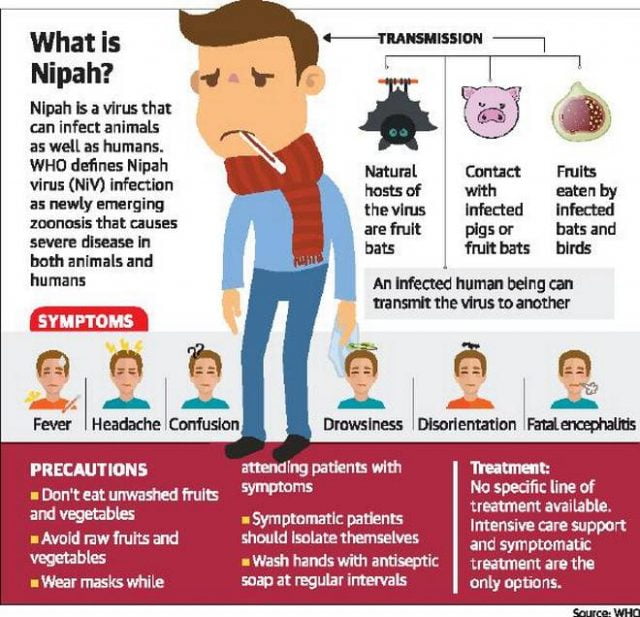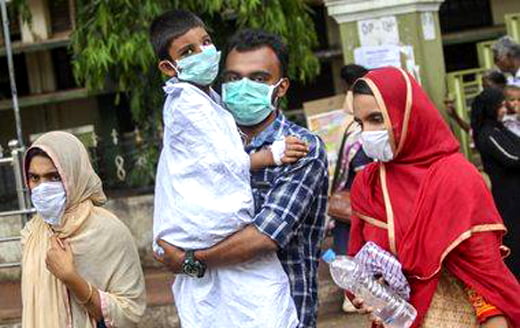Kerala’s Kozhikode district didn’t know the disaster that was about to strike them when they first lost 26-year-old Muhammed Sabith, on May 5.
Sabith’s death was the start of the outbreak of the deadly Nipah Virus in Kerala. So when 3 more deaths followed in the next week, the entire city of Kozhikode was gripped in fear.
Having killed 17 people in the state of Kerala so far, the health officials have already warned of the possibility of a second Nipah Virus outbreak because of the vulnerability of the people who were in close proximity with the affected.
What Is Nipah Virus?
Nipah virus (NiV) infection is a recently emerging zoonosis that can affect both animals and humans.
The disease spreads through fruit bats or ‘flying foxes’. The virus is present in bat urine, faeces, saliva, and birthing fluids.

Mangoes, dates and bananas are the bat’s most preferred fruit.
In Kerala’s case, it was spread when people consumed mangoes infected by the fruit bats.
Signs And Symptoms
Experts say that Nipah Virus is an airborne disease and therefore can affect those who come in direct contact with the contaminated people.
Some common symptoms of NiV are nausea, headache, fever, dizziness, drowsiness and mental issues such as confusion, delirium and other respiratory issues. These symptoms can last up to 7-10 days.

No cure or vaccine has been invented for the virus yet, so treatment is only limited to intensive supportive care means treating the symptoms individually.
So for example, if a person complains of high fever, he can be given medicines to cure his fever and someone complaining of breathlessness can be put on ventilators.
Also Read: How Did The Partition Of India Lead To The Development Of A New Food Culture?
How Did Kerala Handle The Outbreak?
As soon as Nipah Virus outbreak was officially declared, the safety protocols at the Kozhikode Medical College where the infected would be brought were brought upto mark.
The village panchayat where the first victim succumbed, was directed to conduct awareness meetings through ASHA and Anganwadi workers to handle the doubts and queries of the villagers.
The Centre also sent a team headed by the director of National Centre for Disease Control (NCDC) for assistance. A team from AIIMS also visited the affected areas and took some samples for testing purposes.
Considering that the virus is highly contagious, all those who reported fever-like symptoms were brought to Medical College and were isolated in wards. Currently 2,000 people are under observation.
People took extra care to avoid getting infection too. The citizens are staying indoors mostly or using protective masks while outdoors. Schools were suspended, important events like marriages, family functions were postponed.

Areas At High Risk Of Nipah Virus Outbreak
“Due to a high interaction between animals and humans, dense forest, unsanitary conditions and being epidemic zones of encephalitis, they are high risk locations for Nipah and other viruses.”
-said T.N. Dhole, head of microbiology department of Sanjay Gandhi Post Graduate Institute of Medical Sciences (SGPGIMS).
Therefore districts of Gorakhpur and Maharajganj in Lucknow are highly susceptible to Nipah Virus outbreak.
Regarding neighboring areas like Chennai, the city has been declared safe by the authorities.
Two persons were reported being admitted to a government hospital in Tiruchirapalli, Chennai due to a ‘mystery fever’, it was later confirmed it was just fever and nothing else.
Recently United Arab Emirates, (UAE) also banned the imports of fresh vegetables and fruits from Kerala on the basis of information published on World Health Organization’s website.
How To Stay Safe
Although so far, Nipah has affected the state of Kerala only, health officials across India haven’t denied the possibility of Nipah being contracted outside Kerala too.
There is no immediate danger but following guidelines and precautions should be followed.
• People should not consume any fruit which is partially eaten or is having a bite marks by bats or any other animal.
• People are also supposed to not go for self medication and report to hospital immediately if someone is showing symptoms like high fever, nausea, persistent headache, neck rigidity.
• People should also maintain respiratory hygiene (avoiding spiting) and coughing etiquettes (using a clean handkerchief). Wash hands with soap and water before and after meals and visit to outdoors is also encouraged.
• Travel to affected areas of Kerala should be avoided for the time being.
Image Credits: Google Images
Sources: Scroll, Firstpost, Hindu
You’d Also Like To Read:
http://edtimes.in/2018/05/your-step-by-step-guide-on-how-to-get-a-voter-id-card-in-india/
































